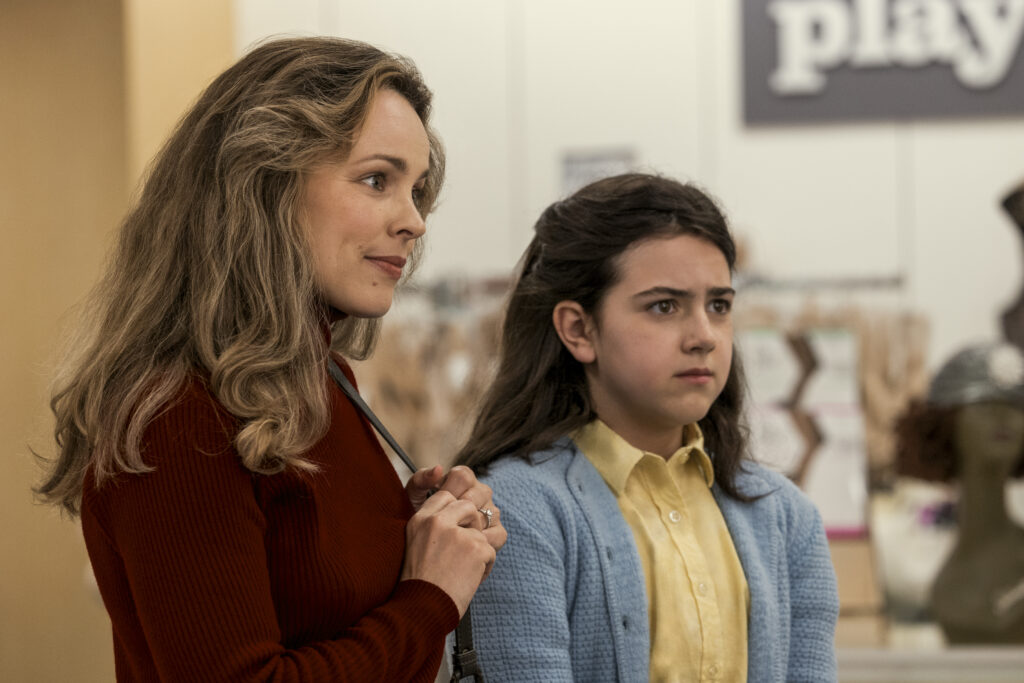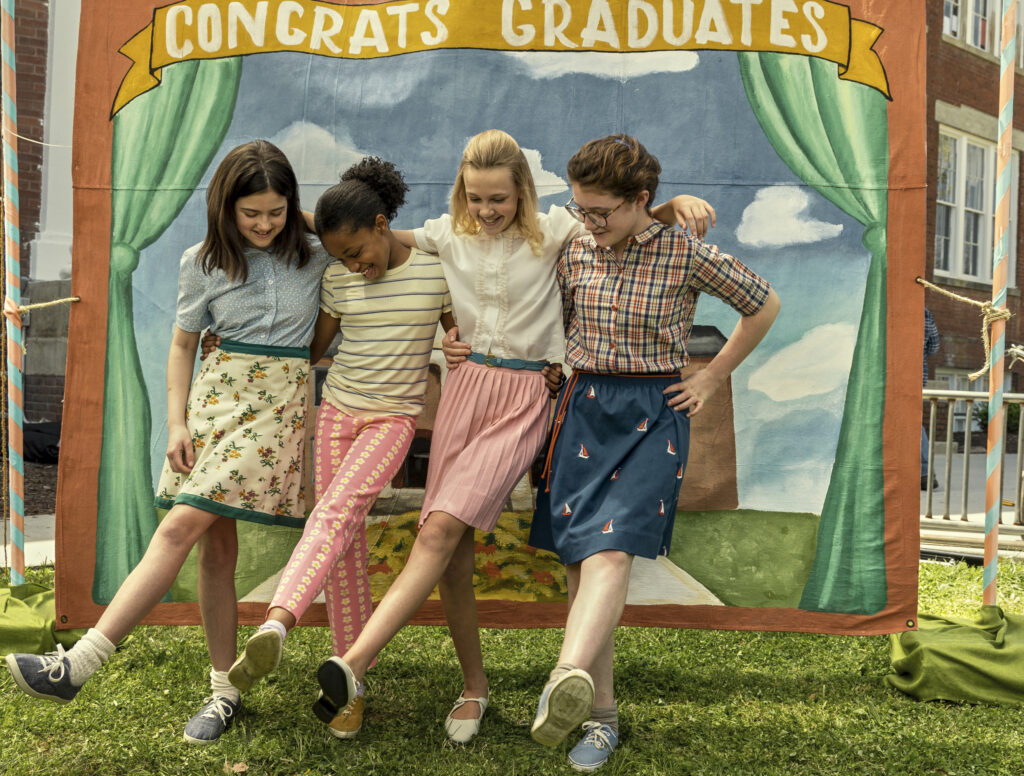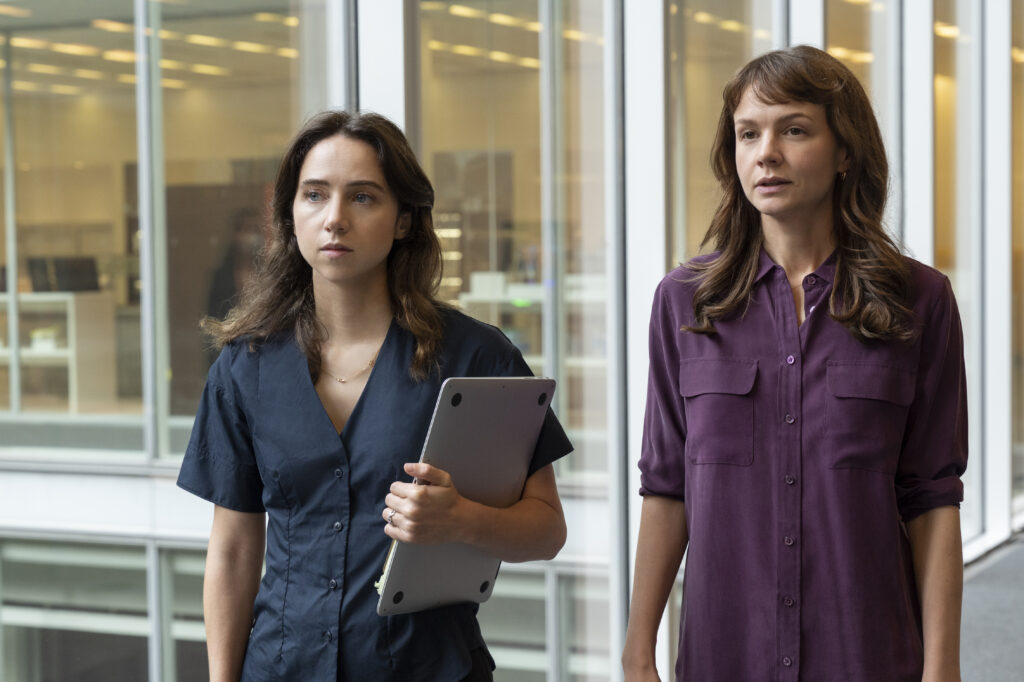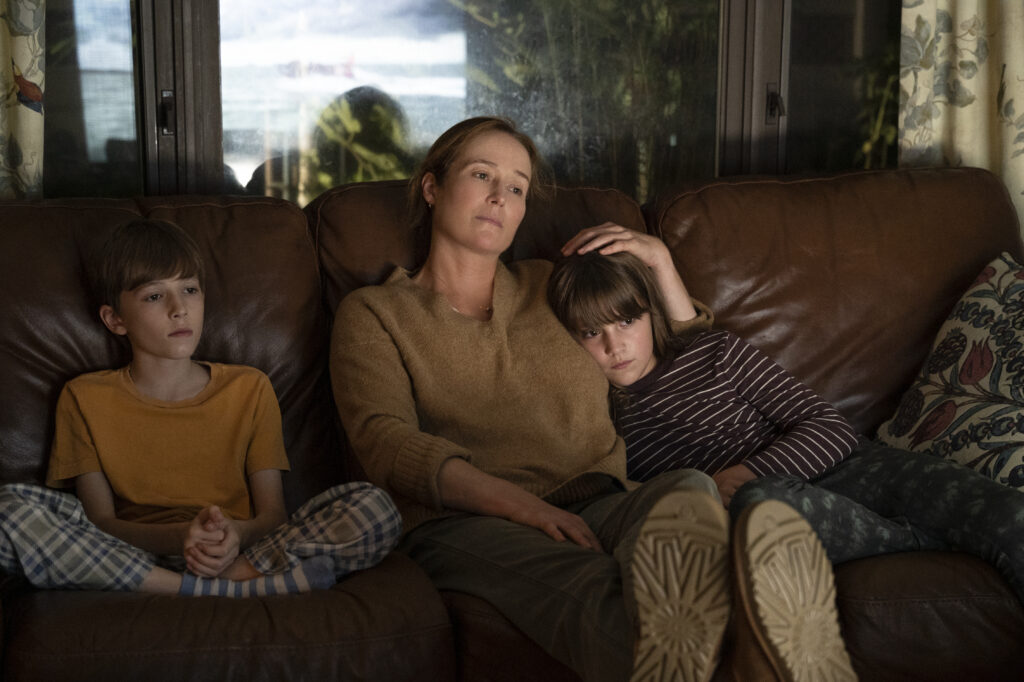April 20, 2023
by Carla Hay

“Are You There God? It’s Me Margaret.”
Directed by Kelly Fremon Craig
Culture Representation: Taking place in 1970, in New Jersey and New York City, the comedy/drama film “Are You There God? It’s Me, Margaret.” (based on Judy Blume’s 1970 novel) features a predominantly white cast of characters (with a few African Americans) representing the working-class and middle-class.
Culture Clash: In a period of time when Margaret Simon goes from 11 to 12 years old, she worries about making friends at her new school, reaching puberty, and dealing with family issues that have to do with her parents’ interfaith marriage.
Culture Audience: “Are You There God? It’s Me, Margaret.” will appeal primarily to fans of the novel on which the movie is based and family-friendly movies about adolescent girls.

Even though Judy Blume has authored many bestselling novel (most in the young adult genre), not many of these books have been made into feature films. The movie adaptation of Blume’s 1970 novel “Are You There God? It’s Me, Margaret.” is a delightful and faithful version of the beloved book. It’s not edgy, but it has accessible and well-done depictions of family angst, adolescent self-discovery and personal growth.
Written and directed by Kelly Fremon Craig, the comedy/drama “Are You There God? It’s Me, Margaret.” has the benefit of a very talented cast that does justice to all the complex emotions that are described in the book. Because the story takes place in 1970, it recalls a simpler time in America, when children did not have to deal with the traumas of cyberbullying and school mass shootings. At the same time, children back then had less resources and less options on how to get information on issues about growing up. Despite the “quaint” aspects of the story, “Are You There God? It’s Me, Margaret.” still has relatable topics that are timeless, especially to girls and women.
The movie “Are You There God? It’s Me, Margaret.” begins with the title character Margaret Simon (played by Abby Ryder Fortson), who has no siblings, feeling uprooted and unsettled. Her father Herb Simon (played by Benny Safdie) has gotten a job promotion, so he and his wife Barbara Simon (played by Rachel McAdams), who is Margaret’s compassionate mother, have decided to move from their New York City apartment to a larger home in New Jersey. The move is only a less than 50 miles away, but it might as well be a long-distance move, as far as Margaret is concerned.
Margaret, who celebrates her 12 birthday during the course of the story, worries about leaving her current friends behind and whether or not she’ll make friends in her new school. The move also means that Margaret won’t be able to spend as much time with Herb’s widowed mother Sylvia Simon (played by Kathy Bates), who lives in New York City and has a close emotional bond to Margaret. Sylvia is the only grandparent in Margaret’s life.
It’s later revealed that Barbara’s parents (who are conservative Christians) disapproved of Barbara marrying Herb, just because Herb is Jewish. Barbara’s parents, who live in Ohio, practically disowned Barbara because of this difference in religion. Barbara has been estranged from her parents for years. As a result, Herb and Barbara have decided not to raise Margaret in any religion and have told Margaret that she can decide which religion (if any) she wants to choose when she’s an adult.
Margaret is worried about other things besides moving to a new place. Many of her female peers are starting to grow breasts and get their menstrual periods. Margaret hasn’t had those biological developments yets, and she’s terrified that she’ll be a considered a “freak” if she’s a late bloomer. Much of the story is about Margaret getting involved in some hijinks (and a lot of talking to God) about wanting to become biologically developed by the time she becomes a teenager.
The movie also prominently features Barbara’s self-discovery and coming to terms with her family issues. Because Herb is earning more money from his job promotion, Barbara has decided to give up her job as an art teacher and become a homemaker. It allows her to spend more time at home and notice more of what’s going on with Margaret, who goes back and forth between confiding in her mother and hiding her true feelings from her mother.
On the day that the Simon family moves into their New Jersey house, a talkative neighbor girl with bossy and elitist tendencies comes over unannounced and invites Margaret to play in the yard sprinklers with her. Nancy Wheeler (played by Elle Graham) considers herself to eb the “queen bee” of her small clique at the school that she and Margaret attend. Nancy invites Margaret into a “secret club” that includes two other students from the school: easygoing Janie Loomis (played by Amari Price) and slightly nerdy Gretchen Potter (played by Katherine Kupferer).
Margaret makes fast friends with this group of girls. But she finds out that being part of this “secret club” comes with a social price. One of the club’s “rules” is that all of the members have to tell each other very private things, such as which boys they have crushes on and when they get their menstrual periods. Nancy is also a catty gossip who spreads unfounded promiscuity rumors about a classmate named Laura Danker (played by Isol Young), who is taller than most of the students and has all the physical developments of a woman.
A lot of stories with these types of adolescent would make a lot of the conflicts center on rivalries to get the attention of boys. There’s a small subplot about Margaret seeming to have a mutual attraction to a “nice guy” classmate nickname Moose Freed (played by Aidan Wojtak-Hissong), who is a friend of Nancy’s bratty older brother Evan Wheeler (played by Landon Baxter). However, the movie is much more focused on the female bonding, such as the relationships that Margaret has with her new friends, as well as those with her mother Barbara and grandmother Sylvia.
If these female relationships are the heart of the story, Margaret’s evolving relationship with God is the soul of the story. Just like in the book, Margaret talks to God during moments when she feels the most hope, fear, confusion and joy. She has to reckon with her evolving feelings about religion when a teacher named Mr. Benedict (played by Echo Kellum) encourages her to choose religion as her subject for an assigned class project where the student can choose which topic to research.
Ryder Fortson gives an utterly charming performance in “Are You There God? It’s Me, Margaret.” She isn’t overly perky, not is she an insufferable grouch. She’s completely convincing as the Margaret character in the way that Blume depicted her in the book. McAdams and Bates also have standout moments in their roles as family matriarchs who are very different from each other but share a similar fierce love for Margaret.
The movie gets occasionally dull and repetitive. This story is not going to endear itself to anyone who will get tired of hearing Margaret mope about how her breasts aren’t growing as fast as she wants to them to grow. And there’s a useless subplot about Barbara volunteering for too many parent-teacher association committees that are overseen by Nancy’s mother Jan Wheeler (played by Kate MacCluggage), who likes to think of herself as the high-society maven of the mothers in the community. (Blume has a cameo in the movie as a dog-walking neighbor.) Jan ends up overloading Barbara with work.
“Are You There God? It’s Me, Margaret.” is certainly told through the lens of middle-class privilege, because it’s about girls who go to summer camp and never have to worry about being homeless or not having enough to eat. If people want a dark and depressing movie about adolescents, this isn’t it. But “Are You There God? It’s Me, Margaret.” delivers what it intends in offering a wistful and nostalgic look at adolescent girlhood in early 1970s America but remaining relatable to anyone who goes though a journey of self-identity.
Lionsgate will release “Are You There God? It’s Me, Margaret.” in U.S. cinemas on April 28, 2023. A sneak preview of the movie was shown in select U.S. cinemas on April 19, 2023.


